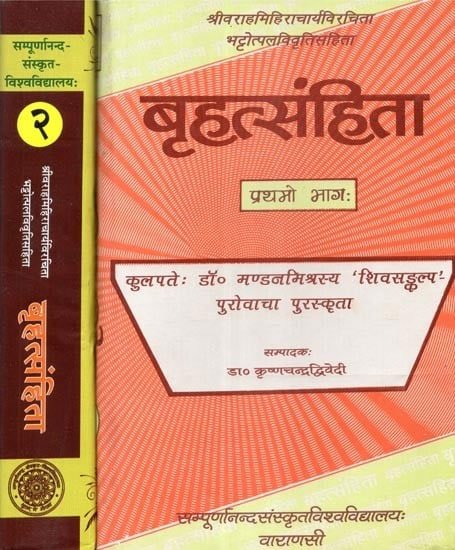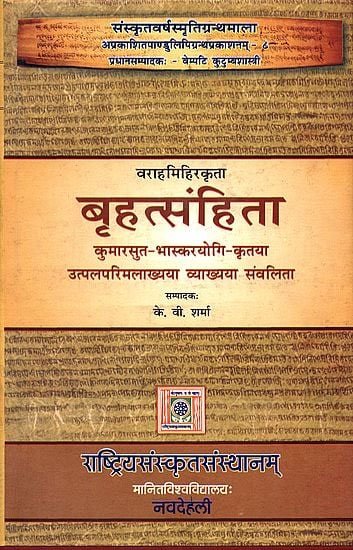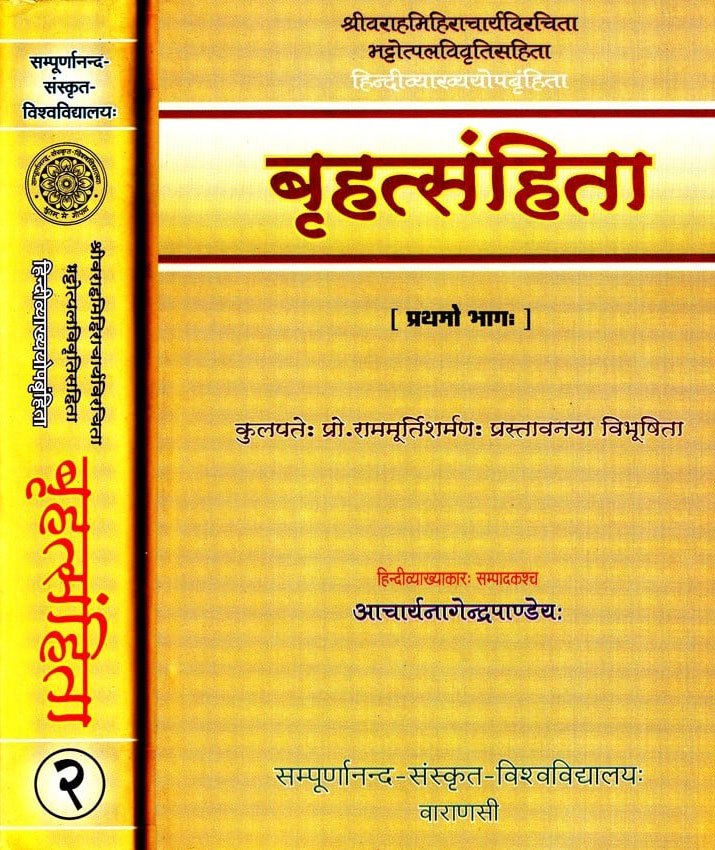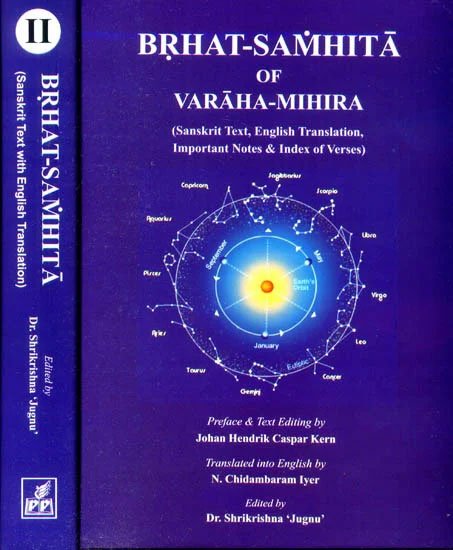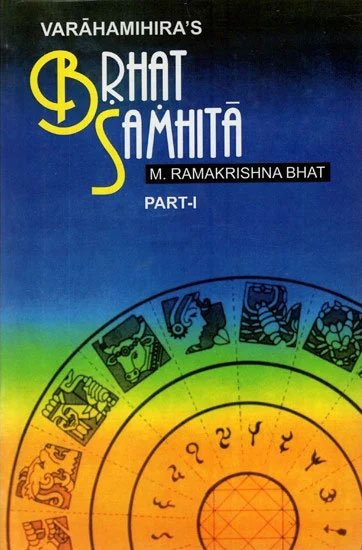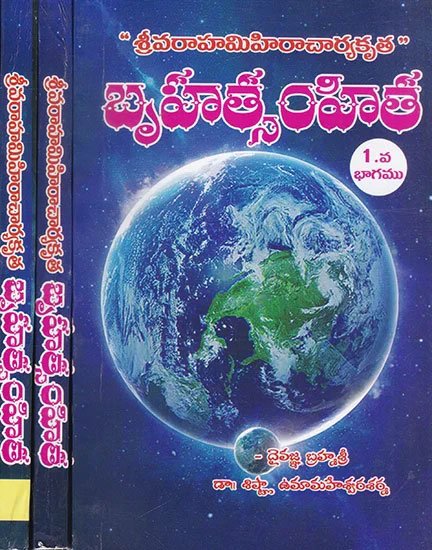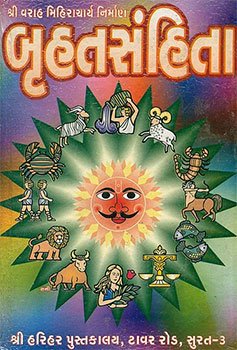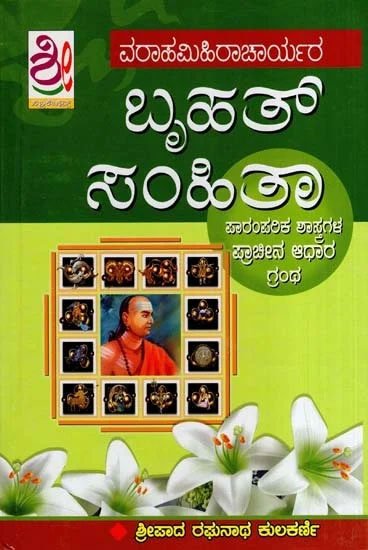Brihat-samhita [sanskrit]
26,560 words
The Sanskrit text of the Brihat-samhita from the 6th-century authored by Varaha Mihira in present-day Ujjain, India. It primarily deals with astrology and astronomy but is presented as an encyclopedia of knowledge.
Verse 103.5
जन्मन्यायासदोऽर्कः क्षपयति विभवान् कोष्ठरोगाध्वदाता वित्तभ्रंशं द्वितीये दिशति च न सुखं वञ्चनां दृग्रुजं च ।
स्थानप्राप्तिं तृतीये धननिचयमुदा कल्यकृच्चारिहर्ता रोगान्दत्ते चतुर्थे जनयति च मुहुः स्रग्धराभोगविघ्नम् ॥ ५ ॥
[धननिचयमुदाकल्यकृच् । हन्ता । धत्ते]
janmanyāyāsado'rkaḥ kṣapayati vibhavān koṣṭharogādhvadātā vittabhraṃśaṃ dvitīye diśati ca na sukhaṃ vañcanāṃ dṛgrujaṃ ca |
sthānaprāptiṃ tṛtīye dhananicayamudā kalyakṛccārihartā rogāndatte caturthe janayati ca muhuḥ sragdharābhogavighnam || 5 ||
[dhananicayamudākalyakṛc | hantā | dhatte]
The Sanskrit text of Verse 103.5 is contained in the book Brihata Samhita (Sanskrit Text with Hindi Translation) by Pandit Achyutananda Jha. This book is available online or you could buy the latest edition:
Read online Buy now! The Sanskrit text by Pandit Achyutananda Jha (2001)
Glossary of Sanskrit terms
Note: This extracts Sanskrit terms and links to English definitions from the glossary, based on an experimental segmentation of verse (103.5). Some terms could be superfluous while some might not be mentioned. Click on the word to show English definitions.
Janman, Ayasa, Arka, Kshapayat, Vibhava, Koshtharoga, Adhva, Data, Vitta, Bhramsha, Dvitiya, Sukham, Sukha, Vancana, Drigruj, Sthanaprapti, Tritiya, Dhana, Nicaya, Kalya, Krit, Cari, Carin, Hartri, Roga, Datta, Datti, Caturtha, Janayat, Sragdhara, Abhoga, Vighna, Uda, Akalya, Hantri, Hanta,
Analysis of Sanskrit grammar
Note: this is an experimental feature and only shows the first possible analysis of the Sanskrit text (Verse 103.5). If the system was successful in segmenting the sentence, you will see of which words it is made up of, generally consisting of Nouns, Pronouns, Verbs, Participles and Indeclinables. Click on the link to show all possible derivations of the word.
- Line 1: “janmanyāyāsado'rkaḥ kṣapayati vibhavān koṣṭharogādhvadātā vittabhraṃśaṃ dvitīye diśati ca na sukhaṃ vañcanāṃ dṛgrujaṃ ca ”
- janmanyā -
-
janman (noun, neuter)[nominative dual], [vocative dual], [accusative dual], [locative single]
- āyāsa -
-
āyāsa (noun, masculine)[compound], [vocative single]
- do' -
-
da (noun, masculine)[nominative single]dā (noun, masculine)[accusative plural], [ablative single], [genitive single]
- arkaḥ -
-
arka (noun, masculine)[nominative single]
- kṣapayati -
-
√kṣap -> kṣapayat (participle, masculine)[locative single from √kṣap class 10 verb]√kṣap -> kṣapayat (participle, neuter)[locative single from √kṣap class 10 verb]√kṣī -> kṣapayat (participle, masculine)[locative single from √kṣī]√kṣī -> kṣapayat (participle, neuter)[locative single from √kṣī]√kṣap (verb class 10)[present active third single]√kṣī (verb class 0)[present active third single]
- vibhavān -
-
vibhava (noun, masculine)[accusative plural]
- koṣṭharogā -
-
koṣṭharoga (noun, masculine)[compound], [vocative single]
- adhva -
-
adhva (noun, masculine)[compound], [vocative single]adhvan (noun, masculine)[compound]
- dātā* -
-
dāta (noun, masculine)[nominative plural], [vocative plural]dātā (noun, feminine)[nominative plural], [vocative plural], [accusative plural]
- vitta -
-
vitta (noun, masculine)[compound], [vocative single]vitta (noun, neuter)[compound], [vocative single]√vid -> vitta (participle, masculine)[vocative single from √vid class 6 verb]√vid -> vitta (participle, neuter)[vocative single from √vid class 6 verb]√vid -> vitta (participle, masculine)[vocative single from √vid class 7 verb]√vid -> vitta (participle, neuter)[vocative single from √vid class 7 verb]√vid (verb class 2)[imperative active second plural]
- bhraṃśam -
-
bhraṃśa (noun, masculine)[adverb], [accusative single]
- dvitīye -
-
dvitīya (noun, masculine)[locative single]dvitīya (noun, neuter)[nominative dual], [vocative dual], [accusative dual], [locative single]dvitīyā (noun, feminine)[nominative dual], [vocative single], [vocative dual], [accusative dual]
- diśati -
-
√diś (verb class 6)[present active third single]
- ca -
-
ca (indeclinable conjunction)[indeclinable conjunction]ca (noun, masculine)[compound], [vocative single]ca (noun, neuter)[compound], [vocative single]
- na -
-
na (indeclinable particle)[indeclinable particle]na (noun, masculine)[compound], [vocative single]na (noun, neuter)[compound], [vocative single]
- sukham -
-
sukham (indeclinable)[indeclinable]sukha (noun, masculine)[adverb], [accusative single]sukha (noun, neuter)[adverb], [nominative single], [accusative single]sukhā (noun, feminine)[adverb]
- vañcanām -
-
vañcanā (noun, feminine)[accusative single]
- dṛgrujam -
-
dṛgruj (noun, feminine)[accusative single]
- ca -
-
ca (indeclinable conjunction)[indeclinable conjunction]ca (noun, masculine)[compound], [vocative single]ca (noun, neuter)[compound], [vocative single]
- Line 2: “sthānaprāptiṃ tṛtīye dhananicayamudā kalyakṛccārihartā rogāndatte caturthe janayati ca muhuḥ sragdharābhogavighnam || 5 |”
- sthānaprāptim -
-
sthānaprāpti (noun, feminine)[accusative single]
- tṛtīye -
-
tṛtīya (noun, masculine)[nominative plural], [locative single]tṛtīya (noun, neuter)[nominative dual], [vocative dual], [accusative dual], [locative single]tṛtīyā (noun, feminine)[nominative dual], [vocative single], [vocative dual], [accusative dual]
- dhana -
-
dhana (noun, masculine)[compound], [vocative single]dhana (noun, neuter)[compound], [vocative single]√dhan (verb class 1)[imperative active second single]
- nicayam -
-
nicaya (noun, masculine)[adverb], [accusative single]
- udā -
-
- kalya -
-
kalya (noun, masculine)[compound], [vocative single]kalya (noun, neuter)[compound], [vocative single]√kal -> kalya (absolutive)[absolutive from √kal]√kal -> kalya (participle, masculine)[vocative single from √kal class 10 verb]√kal -> kalya (participle, neuter)[vocative single from √kal class 10 verb]
- kṛc -
-
kṛt (noun, masculine)[compound], [adverb], [nominative single], [vocative single]kṛt (noun, neuter)[compound], [adverb], [nominative single], [vocative single], [accusative single]
- cāri -
-
cārī (noun, feminine)[adverb], [vocative single]cārin (noun, masculine)[compound], [adverb]cārin (noun, neuter)[compound], [adverb], [nominative single], [vocative single], [accusative single]
- hartā -
-
hartṛ (noun, masculine)[nominative single]√hṛ (verb class 1)[periphrastic-future active third single]√hṛ (verb class 9)[periphrastic-future active third single]
- rogān -
-
roga (noun, masculine)[accusative plural]
- datte -
-
datta (noun, masculine)[locative single]datta (noun, neuter)[nominative dual], [vocative dual], [accusative dual], [locative single]dattā (noun, feminine)[nominative dual], [vocative single], [vocative dual], [accusative dual]datti (noun, feminine)[vocative single]√dā (verb class 3)[present middle third single]
- caturthe -
-
caturtha (noun, masculine)[locative single]caturtha (noun, neuter)[nominative dual], [vocative dual], [accusative dual], [locative single]
- janayati -
-
janayati (noun, feminine)[compound], [adverb]√jan -> janayat (participle, masculine)[locative single from √jan class 10 verb], [locative single from √jan]√jan -> janayat (participle, neuter)[locative single from √jan class 10 verb], [locative single from √jan]√jan (verb class 10)[present active third single]√jan (verb class 0)[present active third single]
- ca -
-
ca (indeclinable conjunction)[indeclinable conjunction]ca (noun, masculine)[compound], [vocative single]ca (noun, neuter)[compound], [vocative single]
- Cannot analyse muhuḥ*sr
- sragdharā -
-
sragdhara (noun, masculine)[compound], [vocative single]sragdhara (noun, neuter)[compound], [vocative single]sragdharā (noun, feminine)[nominative single]
- abhoga -
-
abhoga (noun, masculine)[compound], [vocative single]
- vighnam -
-
vighna (noun, masculine)[adverb], [accusative single]
- Cannot analyse 5
- Line 3: “[dhananicayamudākalyakṛc | hantā ”
- dhana -
-
dhana (noun, masculine)[compound], [vocative single]dhana (noun, neuter)[compound], [vocative single]√dhan (verb class 1)[imperative active second single]
- nicayam -
-
nicaya (noun, masculine)[adverb], [accusative single]
- udā -
-
uda (noun, neuter)[compound], [vocative single]udan (noun, neuter)[compound]√ud (verb class 6)[imperative active second single]
- akalya -
-
akalya (noun, masculine)[compound], [vocative single]akalya (noun, neuter)[compound], [vocative single]
- kṛc -
-
- hantā -
-
hantṛ (noun, masculine)[nominative single]hantā (noun, feminine)[nominative single]√han (verb class 1)[periphrastic-future active third single]√han (verb class 2)[periphrastic-future active third single]
Other editions:
Also see the following editions of the Sanskrit text or (alternative) English translations of the Verse 103.5
Brhatsamhita with the Commentary of Bhattotpala
by Krishna Chandra Dwivedi (2016)
Publisher: Sampurnanand Sanskrit University; 1229 pages;
Buy now!
Brihat Samhita with the Commentary of Utpalapatimala of Yogisvara
by K. V. Sharma (2012)
Publisher: Rashtriya Sanskrit Sansthan, Janakpuri; 754 pages; ISBN-10; 8186111360; ISBN-13: 9788186111369
Buy now!
Brihat Samhita (Hindi Translation)
by K. V. Sharma (2002)
Publisher: Sampurnanand Sanskrit University; 2359 pages; ISBN-13: 9789387890008.
Buy now!
Brhat Samhita (English translation)
by N. Chidambaram Iyer (2022)
Publisher: Parimal Publication Pvt. Ltd.; 801 pages; Edited by Dr. Shrikrishna Jugnu; ISBN-10: 8171104215; ISBN-13: 9788171104215.
Buy now!
Brhat Samhita (English with notes)
by M. Ramakrishna Bhat (2010)
Publisher: Motilal Banarsidas Publishers Pvt. Ltd.; 1155 pages; ISBN-10: 8120810600; ISBN-13: 9788120810600.
Buy now!
Brhat Samhita (Telugu translation)
by Sishtla Umamaheswara Sharma (2020)
Publisher: Mohan Publications, Andhra Pradesh; 846 pages.
Buy now!Preview of verse 103.5 in Kannada sript:
ಜನ್ಮನ್ಯಾಯಾಸದೋಽರ್ಕಃ ಕ್ಷಪಯತಿ ವಿಭವಾನ್ ಕೋಷ್ಠರೋಗಾಧ್ವದಾತಾ ವಿತ್ತಭ್ರಂಶಂ ದ್ವಿತೀಯೇ ದಿಶತಿ ಚ ನ ಸುಖಂ ವಞ್ಚನಾಂ ದೃಗ್ರುಜಂ ಚ ।
ಸ್ಥಾನಪ್ರಾಪ್ತಿಂ ತೃತೀಯೇ ಧನನಿಚಯಮುದಾ ಕಲ್ಯಕೃಚ್ಚಾರಿಹರ್ತಾ ರೋಗಾನ್ದತ್ತೇ ಚತುರ್ಥೇ ಜನಯತಿ ಚ ಮುಹುಃ ಸ್ರಗ್ಧರಾಭೋಗವಿಘ್ನಮ್ ॥ ೫ ॥
[ಧನನಿಚಯಮುದಾಕಲ್ಯಕೃಚ್ । ಹನ್ತಾ । ಧತ್ತೇ]
Brhat Samhita (Gujarati translation)
by - (2000)
Publisher: Shree Harihar Pustakalay, Surat; Author: Shri Varahamihira Acharya (શ્રી વરાહમિહીરાચાર્ય); 432 pages.
Buy now!Preview of verse 103.5 in Gujarati sript:
જન્મન્યાયાસદોઽર્કઃ ક્ષપયતિ વિભવાન્ કોષ્ઠરોગાધ્વદાતા વિત્તભ્રંશં દ્વિતીયે દિશતિ ચ ન સુખં વઞ્ચનાં દૃગ્રુજં ચ ।
સ્થાનપ્રાપ્તિં તૃતીયે ધનનિચયમુદા કલ્યકૃચ્ચારિહર્તા રોગાન્દત્તે ચતુર્થે જનયતિ ચ મુહુઃ સ્રગ્ધરાભોગવિઘ્નમ્ ॥ ૫ ॥
[ધનનિચયમુદાકલ્યકૃચ્ । હન્તા । ધત્તે]
Brhat Samhita (Kannada translation)
by Sripada Raghunatha Kulkarni (2021)
Publisher: Srinidhi Publications, Bangalore; 668 pages with illustrations.
Buy now!Preview of verse 103.5 in Kannada sript:
ಜನ್ಮನ್ಯಾಯಾಸದೋಽರ್ಕಃ ಕ್ಷಪಯತಿ ವಿಭವಾನ್ ಕೋಷ್ಠರೋಗಾಧ್ವದಾತಾ ವಿತ್ತಭ್ರಂಶಂ ದ್ವಿತೀಯೇ ದಿಶತಿ ಚ ನ ಸುಖಂ ವಞ್ಚನಾಂ ದೃಗ್ರುಜಂ ಚ ।
ಸ್ಥಾನಪ್ರಾಪ್ತಿಂ ತೃತೀಯೇ ಧನನಿಚಯಮುದಾ ಕಲ್ಯಕೃಚ್ಚಾರಿಹರ್ತಾ ರೋಗಾನ್ದತ್ತೇ ಚತುರ್ಥೇ ಜನಯತಿ ಚ ಮುಹುಃ ಸ್ರಗ್ಧರಾಭೋಗವಿಘ್ನಮ್ ॥ ೫ ॥
[ಧನನಿಚಯಮುದಾಕಲ್ಯಕೃಚ್ । ಹನ್ತಾ । ಧತ್ತೇ]
![Brihat-samhita [sanskrit] - book cover](/uploads/a/Brihat-Samhita-Sanskrit.jpg)
